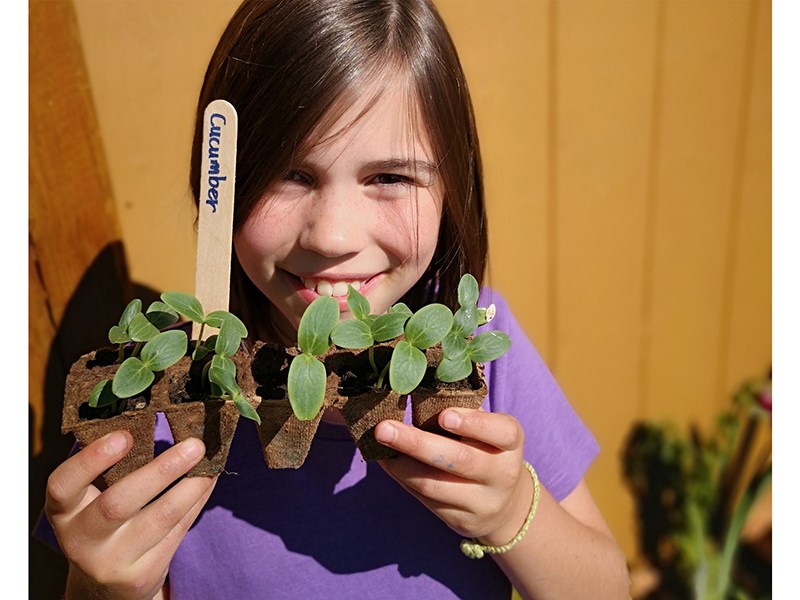Interest in gardening has taken root in School District 47.
While the emergence of the COVID-19 pandemic has suspended in-class activity, the school district’s food literacy program has managed to distribute more than 200 growing kits to families, containing pea and sunflower seeds.
“The school district has done a pretty amazing job,” said Vanessa Sparrow, the school district’s food literacy coordinator. “We’re quite innovative in some of the things we are doing. It’s rare for a school district to have a garden-based education program.”
The program has been in place for about a year and a half, said Sparrow. The school district recognized it is important to offer skills and knowledge students need to make healthy food choices for themselves, she added.
“Given there are school gardens in each of the elementary school campuses, they came to the decision that having a paid coordinator to assist schools to make the most of those assets, and offer students hands-on experiential learning opportunities outside of the classroom, and taking it to the outdoor classroom, would be a good thing to do,” said Sparrow. “There’s so much evidence to show and support that, so in a way it was a bit of a no-brainer.”
Sparrow said she thinks the school district recognized having somebody who could build relationships with school administrators, teachers and work with students regularly over the long term would result in better outcomes. She said the program is building on the expertise teachers already have. Prior to the food literacy program, teachers were taking leadership in garden-based education to the extent they could, according to Sparrow. She added that having someone to help teachers do activities with a class of 25 can be very helpful.
“The approach we are taking is what you would call seed to plate, so students can experience the delight of planting seeds, caring for seeds, taking the stewardship and responsibility to bring them to maturity and then harvesting that food and learning to prepare it,” said Sparrow. “We don’t just grow food; we also take it back into the school and we cook. That’s pretty much the favourite part for kids.”
Sparrow said the model she’s using is based on a program called landed learning that came out of UBC many years ago. She was part of that program.
“I was very fortunate; it kind of changed my life,” she said. “In consultation with the director of that program, we worked together to adapt it for the environment here in Powell River, which is very different to metro Vancouver.
“That model uses the idea of intergenerational mentorship, which is a crucial element to what we are doing and part of why the school district is being progressive. I have 15 committed and amazing volunteers, many of whom are ex-teachers and a lot of them are master gardeners, who work with the kids over the course of 10 sessions in a year. They come together and work in small groups.”
Ratio of volunteers to students is usually two to three volunteers to four to five students, according to Sparrow.
“You can really go deep and that’s what happens,” she said. “As much as we are learning about food, and how to grow and prepare it, there’s also the development of those relationships. Students are blossoming under the care and mentorship of those volunteers and it works both ways. The reason why I’m able to retain these volunteers and get such commitment out of them is because they get to experience that relationship as well.”
This approach was piloted in Westview Elementary School and had been successful, according to Sparrow, until it was interrupted by COVID-19. A modified version was taken into the other elementary schools and the same kind of content was delivered.
“The plan is to build up the capacity in schools so in time, we’ll be able to roll out the mentoring in all of the elementary schools at some point,” said Sparrow.
While the educational year and growing year do not coincide, Sparrow said there may be provision in future to hold summer gardening camps, where students come to various school gardens and activity days are run.
Sparrow said this is not just about empowering students. She said once they go back home and clamour for kale chips or are excited about their bean shoots, or they want to plant peas, that has resonance with their families. She said this is being seen with growing-at-home kits the school district has been sending home.
“It sparks the interest; it might get the gardening going and it helps develop a sense of exploration and curiosity,” said Sparrow. “That’s the magic of growing things. I’ve been doing it a long time but I don’t think I get tired of seeing my seeds pop their little heads up.”
Sparrow said the program has sent more than 200 growing kits home with students and also some potatoes in burlap sacks. She said she’s had incredible support from volunteers, who have donated all kinds of materials, and from the community. Mother Nature has been an ongoing partner and very generous with discounts and donations to the food literacy program, said Sparrow. The program has also received burlap sacks from River City Coffee and 32 Lakes Coffee for the potato growing portion of the in-home program.
Post-COVID-19, Sparrow is not sure what will happen. She said the pilot program cannot pick up where it left off because the plants have been growing while students have been away from school.
“But as soon as we’re able to, and when we’re given permission, we’ll be right back there with our hands in the soil,” she added.
For more information on the school district’s food literacy program, go to sd47foodliteracy.com, and the Powell River Landed Learning page on Facebook.



